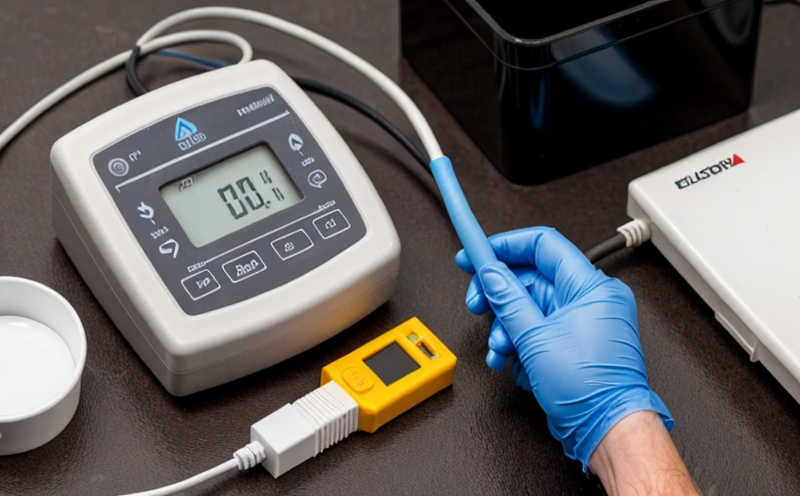UNE EN ISO 17864 Electrochemical Testing in Marine Structures
The UNE EN ISO 17864 standard provides a detailed framework for assessing the corrosion resistance of materials used in marine structures. This electrochemical testing method is critical for ensuring that materials will perform reliably under harsh maritime conditions, which are characterized by high humidity, salt spray, and exposure to various chemicals.
The test procedure involves the use of an electrolytic cell where a specimen material is exposed to a controlled environment with a specific pH level. The potential difference between the cathode and anode in this cell determines the rate at which corrosion occurs. By monitoring these parameters over time, we can predict the long-term performance of materials used in marine applications.
The UNE EN ISO 17864 method is widely recognized for its accuracy and reliability, making it a preferred choice among quality managers, compliance officers, R&D engineers, and procurement professionals. It allows businesses to make informed decisions about material selection and design optimization, thereby reducing the risk of premature failures in critical infrastructure.
The testing process typically begins with careful specimen preparation. This involves cleaning the surface to remove any contaminants or coatings that might interfere with the electrochemical reactions. Once prepared, the specimens are subjected to a series of tests under controlled conditions, including variations in temperature and humidity.
During these tests, real-world parameters such as salt concentration, pH levels, and exposure time play crucial roles in determining the corrosion resistance of the materials. The data collected from these experiments is then analyzed using advanced statistical methods to ensure that it meets the stringent requirements set forth by ISO 17864.
The results are reported comprehensively, detailing the performance characteristics of each material tested. This includes not only the rate of corrosion but also other relevant factors such as resistance to pitting and crevice corrosion. The detailed reports serve as valuable tools for decision-makers in selecting the most appropriate materials for their marine structures.
By adhering strictly to UNE EN ISO 17864 standards, we ensure that our clients receive accurate and reliable results. This not only enhances the quality of the products but also contributes significantly to cost savings by preventing costly failures in the field.
The importance of this standard cannot be overstated, especially for industries such as shipbuilding, offshore oil and gas platforms, and coastal infrastructure development. It provides a robust foundation for ensuring that materials used in these environments are capable of withstanding the rigors of marine exposure.
Scope and Methodology
| Test Parameters | Description |
|---|---|
| Potential Difference Measurement | The potential difference between the cathode and anode is measured using a high-precision voltmeter. |
| Electrolyte Composition | The electrolyte used for testing consists of a specific concentration of saltwater to simulate marine conditions. |
| Temperature Control | The test specimens are exposed to controlled temperature environments to mimic real-world conditions. |
| Time Intervals for Testing | The testing is conducted over various time intervals to observe the long-term corrosion resistance of materials. |
International Acceptance and Recognition
The UNE EN ISO 17864 standard is widely recognized across various sectors, including shipbuilding, oil & gas, and coastal infrastructure. Its acceptance in international markets ensures that the results of electrochemical testing are universally applicable and accepted.
Organizations such as Lloyd's Register, DNV GL, and ABS have incorporated UNE EN ISO 17864 into their certification processes, further emphasizing its importance in the industry. This standardization not only enhances the reliability of test results but also streamlines compliance procedures for businesses operating internationally.
The international acceptance of this standard is a testament to its robustness and consistency. By adhering to these guidelines, companies can ensure that their products meet the highest global standards, thereby gaining competitive advantages in both domestic and foreign markets.
Competitive Advantage and Market Impact
Adhering to UNE EN ISO 17864 not only ensures compliance with international standards but also provides significant competitive advantages. By demonstrating a commitment to quality through rigorous testing, companies can differentiate themselves in the marketplace.
The detailed reports generated from these tests provide valuable insights into material performance under marine conditions. This information is invaluable for R&D teams looking to innovate and improve product design. Additionally, the transparency of the process fosters trust with clients and stakeholders, enhancing overall brand reputation.
In the context of procurement, UNE EN ISO 17864 helps organizations select high-quality suppliers who meet stringent performance criteria. This leads to more reliable supply chains and ultimately contributes to a higher quality of end products.
For businesses operating in competitive environments where reliability and longevity are paramount, compliance with this standard can be the deciding factor between success and failure. It ensures that materials used in marine structures are not only durable but also environmentally friendly, aligning with global sustainability goals.





